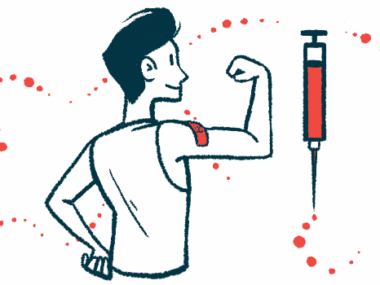PTSD and Me: How a Myasthenic Crisis Changed My Life
Written by |

Some events in life are like a door hinge: They are so transformational that they cause you to swing entirely in a different direction.
For example, years before I began dealing with the first symptoms of myasthenia gravis (MG), I suffered the loss of my father. That was the first major “door hinge” that changed the direction of my life.
About seven years later, my life swung again when I was diagnosed with MG. It was distressing, but I dealt with my feelings at the time by focusing on getting better. I didn’t truly experience trauma and all of the effects of MG until I later had a myasthenic crisis. That experience became the metaphorical door hinge to rival all of them.
I’d been taking the synthetic hormone prednisone since being diagnosed, and about a year later, I started to slowly lower the dosage. But as the number of pills I was taking decreased, my MG symptoms worsened. My muscles grew weaker at a rapid pace, and I was taken by ambulance to the hospital because I couldn’t walk.
Hospital staff tried to insert a feeding tube up my nose and down my throat, but I couldn’t swallow it due to muscle weakness. As I aspirated into my lungs, several doctors and nurses rushed into my room.
As they pushed and pulled my body around, I gasped for the little air that could make it into my lungs. I was quickly moved to the emergency room. The last thing I remember before losing consciousness was a doctor pulling my head toward the end of the bed, and then seeing some kind of metal instrument above my face.
When I woke up, I had a feeding tube down my throat and was intubated so that I could breathe. I was still in shock, but I decided to focus my energy on getting better.
Two years after that experience, I was strong enough to undergo a thymectomy. Because I was focused on the mechanics of the surgery, I didn’t realize it would be the first time back in a hospital since my myasthenic crisis. I should have known I would be unprepared to be in a hospital setting again.
After I changed into a hospital gown, my blood pressure surged. Tears welled up in my eyes, and I couldn’t get my breathing under control. The nurses tried to calm me down, and even allowed my mom and sister to sit with me while I waited. They discussed the possibility of giving me a mild sedative to relax me, but they were nervous it might trigger my MG.
I eventually calmed down enough to have the surgery without further complications. Years later, after ruminating on it and recalling the events in the ICU, I realized that the panic attack wasn’t a random experience, but rather a symptom of post-traumatic stress disorder (PTSD).
I’ve previously written about that experience in the ICU, but I avoided thinking about the ramifications of it for too long. Perhaps I’m more mature now, but today I accept that I have PTSD. Other things have occasionally reminded me of that day, which has caused me to freeze up. It’s like a part of me will always be stuck in that ICU.
While not everyone experiences PTSD, it’s important to know how it can affect people. PTSD Awareness Day is June 27. I encourage anyone who is still coming to terms with something that has happened to them to do some research about PTSD. I want you to know that you’re not alone.
We all have burdens. Although it has taken me a long time to learn this, I now know I can share those burdens with my loved ones, just as they can share theirs with me. We all experience those door hinge moments, but we don’t need to do so alone.
***
Myasthenia Gravis News is strictly a news and information website about the disease. It does not provide medical advice, diagnosis or treatment. This content is not intended to be a substitute for professional medical advice, diagnosis, or treatment. Always seek the advice of your physician or other qualified health provider with any questions you may have regarding a medical condition. Never disregard professional medical advice or delay in seeking it because of something you have read on this website.






helen kurz
i've had 4 mg crisis. i was on a vent for 63 days for one icu admission. my ptsd experiences leave me weepy, angry and short of breath. it is hard to get the medical profession to accept this reality. thanks this article
Michelle Gonzaba
I am so sorry you have gone through so much. I can't even imagine being on a vent for that long. The first (and to me, hardest) step is to acknowledge PTSD and you've already done that, which is amazing. Thank you for sharing some of your MG story and I send you good vibes!
nancy
I just had my thymus removed last week I am hoping to reverse the disease i was told at my age it was not an option i left that doctor i am now on solaris but i hope i can stop the droppy eye
Michelle Gonzaba
Hi Nancy! I hope you are recovering well after your surgery. It sounds like you are on the way to getting better. Thanks for reading!
Vi Dian G. Abalos
Thank you so much everyone like me who is MG patient reading your experiences plift my spirit & strengthen my mind soul. I'm not alone😀👍😀😀
Michelle Gonzaba
Hello Vi, thank you for reading! I really appreciate your comment. I'm so happy I can help you feel more positive and hopeful. You are not alone!
Elspeth Tavaci
Thank you for this article. I was diagnosed with myasthenia in August 2020 after getting a droopy eyelid in June during London's first covid lockdown. I have struggled to believe in the diagnosis as prednisone did nothing and other muscles in my body started to become weak after I started taking it. Up til then it had just been the eye. At the beginning of May 2021, after changing neurologists, I started taking prednisolone and everything started to improve. I've just had a little flare up with the eye this week, I can see now due to stress. I'm not sure what will happen when they reduce the dose of prednisolone.
Oddly my next door neighbour has also just been diagnosed with myasthenia. I wonder if there will be a surge in cases caused by this pandemic and the added stress it has brought to people's lives.
I lost my mum 10 years ago and I was quite traumatised by it so I can relate to your story. Thank you for sharing it.
Michelle Gonzaba
Hi, Elspeth! Thank you for reading and sharing your story. I can't imagine the stress of having symptoms of MG while in lockdown. It's scary enough during a "normal" time! I'm so glad you are doing better. I've also had flare-ups due to stress so I can totally relate. That's crazy about your neighbor-I've never met anyone (outside of the internet) who has MG so for your neighbor to have it too is pretty rare!
I'm so sorry about the loss of your mother. I'm glad my story can show you and others with MG that you aren't alone.
Joyce Siegel
I so look forward to reading your column, Michelle. You are a bright ray of hope!
I’m off of Prednisone after a year of it and one month later symptoms of MG reappeared. Because I had a blood clot in my leg last September, my neurologist Won’t go the Prednisone route again. I am on Mestinon only and he suggested IVIG treatments. I am thinking instead to go with a Functional Medicine doctor as I’ve read such brilliant success with functional medicine in treating autoimmune disease.s. Any thoughts you have would be much appreciated. Joyce
Michelle Gonzaba
Hi Joyce, thank you so much for your kind comments. You don't know how happy they make me!
I wish I could give my own thoughts, but I really don't know much about functional medicine. We have a forum on this website (the "Forums" tab is towards the top of the page and to the left of the yellow "COVID-19" button) where you could see if other MG patients have experience with functional medicine.
Thank you for reading!
Mario Sylvester
Good day thank you for the article i think we have the similar experience thanks for sharing keep on sharing to all with this rare disease of MG keep up the good work.
Michelle Gonzaba
Thank you Mario, I really appreciate your kind words! I hope you are doing well!
Elspeth
I think the lockdown affected both of us in different ways. We didn't have access to our usual 'stress release' activities. I go to the cinema, theatre, art galleries and all those were closed. I also go for long walks. We had no transport so had to walk in the nieghbourhood which was stressful in itself as the pavements and walkways were crowded and hundreds of people were jogging and breathing heavily out on you as they passed which was nerve wracking as we didn't know much about covid and how it was passed on in those early days. I passed a jogger for the first time in a long while yesterday and felt panic so I now think that had a big effect on me back in March- June 2020.
My neighbour was doing up his house and everything that involved was doubly stressful during lockdown.
My treatment
I was just on Mestinon for 4 months and it didn't help much, in fact my symptoms just seemed to get worse after I started taking it. I went from having just ocular mg, to muscle weakness in my shoulders, arms and legs and ended up not able to walk or climb stairs or get in and out of a bath. I was completely reliant on my wonderful husband. I wasn't able to get any support from my neurologist at Kingston Hospital in London. I was just left to deal with the condition on my own til the end of April and to try and learn about MG from the internet.
I am now with a new neurologist. I was prescribed prednisolene at the end of April 2021 and it immediately helped and I began to get back to normal. I am still on prednisolone 80mg. It seems a heavy dose now. I stopped taking the Mestinon. I still can't see any affect from it. I'm not sure what will happen next.
Michelle Gonzaba
I completely agree about the "stress release" activities. For me, going to the movies is a huge stress relief activity for me and it was so hard when I couldn't go for over a year. Luckily, I was finally able to go to the theater just in the last week.
It sounds like you're on a good path now after going through a difficult time during quarantine. I hope things keep improving. Thank you for reading and commenting!
Celia Jane Herbert
I have had MG for fifty years. I think the shock of realising I had such an awful illness at the age of 23 and just five months after my marriage, has never really left me. It has defined my whole life. The thymectomy was awful and constantly dealing with medics who haven't a clue is stressful but don't despair. I was told that pregnancy would be difficult and child birth, dangerous. It was no picnic but I went ahead and had two beautiful sons. However bringing them up was hard work but my wonderful husband more than did his bit with the result that the boys are very close to their father. I also dipped out financially as I couldn.t work and I had a good job as a police civilian secretary before I was diagnosed but that had to go. My husband has been an air traffic controller in the RAF all his working life which meant we were always moving around the UK and abroad. I quite enjoyed the life but it wasn't really helpful to have MG especially when so many social functions were part of the job and my speech was poor. Also medical treatment was never very good except for when we were posted to the Oxford area and I came under the local hospital there which was of course attached to the university so I tried out some treatments. The best of all was an immunosuppressant, Azathyaprine. It worked wonders for me and for three decades I took it with impunity but eventually my neuro took me off it and replaced it with ye olde Mestinon! Effective but troublesome. It wears off too quickly and gives me stomach cramps, but we are where we are and I can honestly say that I have had a wonderful life living with MG. I am still happily married after more than fifty years. We have been all over the world and had many adventures but now we are retired and back in our home town in Devon. My boys are both married and live in the same area so I see them a lot and I am so fortunate in that I adore my daughters in law. I also have two adorable grandchildren who I see often. Not a bad life eh? However I am in a bit of a fix at the moment as I need a total knee replacement and my surgeon fears a Myasthenic crisis so I am waiting to hear how this is going to be resolved. Has anyone else in this community been in a similar situation? Whatever, thankyou for reading this and to all newly diagnosed MG sufferers I say' don't despair! you can still have a very good life and a long one even with Myasthenia Gravis. XX Celia Herbert.
Michelle Gonzaba
Celia, I can't tell you how hopeful I am after reading your comment. I haven't met many people who have lived with MG for such a long time, so your story fills me with happiness. It sounds like you've lived an amazing life so far!
About your knee surgery: I haven't had surgery (other than the thymectomy) since being diagnosed with MG. I am not giving medical advice, but I have heard that some people had IVIG waiting for them after surgery in case they had a great amount of weakness.
I hope you and your doctor find a solution so you can have your surgery. Thank you for commenting and reading!